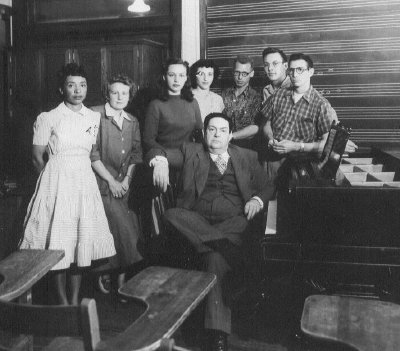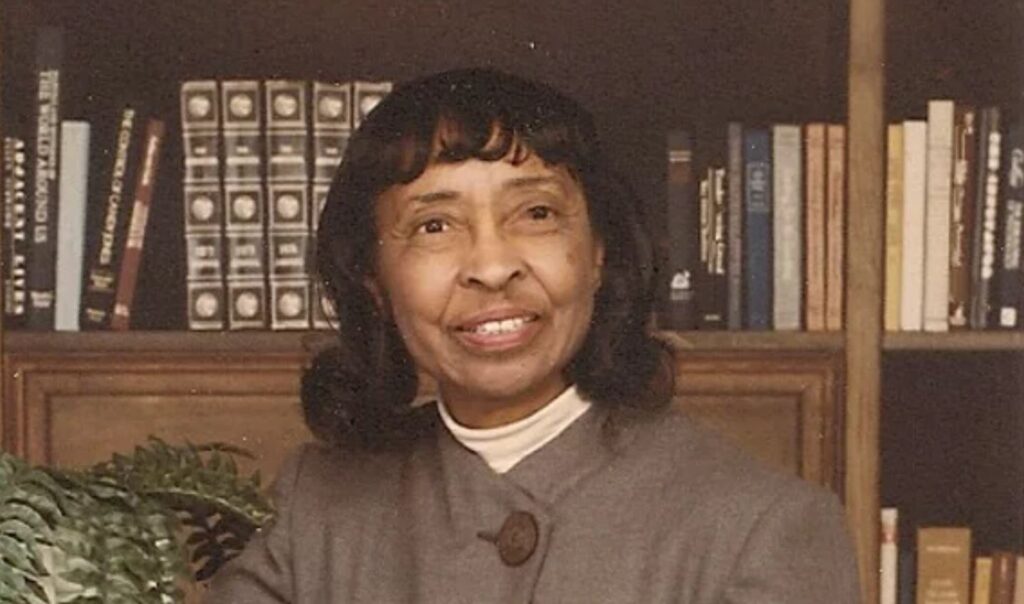Whaaaa??? Another composer named Perry? And also a long neglected African-American woman? In these pages you’ve read a lot about Julia Perry whose Centennial is being celebrated this year, but today let’s recognize another Perry! Zenobia Powell Perry was born on this day in 1908 (probably). She died in 2004. Perry was her married name and she does not have any family connection to Julia Perry. And both Perry’s were very different types of composers. We think you will enjoy this essay in our series, Composers to Discover! featuring research by students in the Public Musicology Certificate Program at Columbus State University. Today’s essay is by Jane Henager, who is studying for a degree in Viola Performance.
When one considers influential composers in recent American history, one who deserves to be more represented is Zenobia Powell Perry. Her impact was immense, not only with her stellar composition skills, but also with her dedication to mentoring future generations and her devotion to the advocacy of civil rights and diversity and representation in the classical music sphere. Perry was born on October 3, 1908 in Boley, OK to a well-educated middle class African-American family. She also had Native American ancestry on her mother’s side as well. Her father, Calvin Bethel Powell was a physician, and the financial stability of the family allowed her to begin musical training at an early age. Her first piano teacher was Mayme Jones, a student of R. Nathaniel Dett. Zenobia Powell Perry went on to win a piano competition in 1919, when she was only eight years old.

Zenobia Powell Perry (far left) with Darius Milhaud, 1949, Univ. of Wyoming (Source: Wikipedia)
When Perry graduated from high school in 1925, she continued her musical education at the Cecil Berryman Conservatory, graduating in 1929. Powell was always on the pursuit of knowledge to extend her mastery, and she also studied at the Tuskegee Institute (Alabama), Langston University, and Colorado State College, where she received her Masters of the Arts. Her brief studies at Langston University (an historically Black university in Oklahoma) was pivotal in her life, as her mentor there, Cortez Reece, encouraged her to begin composing. This encouragement led her to continue studying with mentors such as Darius Milhaud, Alan Willman, and Charles Jones.
Her style was tonal, incorporating contrapuntal techniques and deriving influence from jazz, folk, and singing traditions, such as African American spirituals and work songs. Perry composed many orchestral works, as well as a Mass and even an opera about the history of the Underground Railroad in the town of Wilberforce, Ohio. This piece was one of her most notable works, originally performed in 1987 before resurfacing in 2014. Titled Tawawa House, it was based off of a real place in Wilberforce, Ohio. Tawawa House was a hotel popular in the 1850’s for slaveholders passing through the area; however, it was also a safehouse of the underground railroad. The opera by Perry follows the lives of the escaped slaves who passed through. Here is an orchestral suite from the opera, and here is a clip that gives an introduction to it.
Another notable work of Zenobia’s, and probably her most performed, is the song cycle titled Threnody (1974). Originally called Atmosphere: A Cycle of Songs. The cycle features Threnody (1969), Alien (1970), Benediction (1972), Poet (1969), and Pastourelle (1971). It sets the poetry of Donald Jeffery Hayes. These songs were written for a soprano voice with piano accompaniment, as Perry wanted to write a piece for her daughter, soprano Janis-Rozena Peri.
Perry participated in Eleanor Roosevelt’s black teacher-training program as a composition and education expert, a venture which helped sponsor her extensive education. Around 1941, Perry began studying at Colorado State Teachers College, and began teaching elementary students in 1942. She finished her Masters of Arts Degree at Colorado State in 1945. Her first collegiate faculty position was the University of Arkansas, Pine Bluff from 1947-1955. From there, she taught at the Central State University in Wilberforce, Ohio from 1955-1982.
 Zenobia Powell Perry’s inspiration for composing was influenced by her upbringing as a black American woman whose life was severely impacted by the Jim Crow laws which devastated her Oklahoma hometown of Boley. She strived to change lives and use her art and influence to advocate for equality and representation for black Americans. Outside of her musical career, she had joined the NAACP in 1962 to help aid the efforts for civil rights and equality. In addition, her art reflected and aided her own personal struggles throughout her lifetime. Her first husband left her when she was pregnant with her first child, and she also lost this son when he was only 11. Perry experienced struggles that no one should have to go through, yet she persevered and excelled as a composer, mother, and musician, despite it all.
Zenobia Powell Perry’s inspiration for composing was influenced by her upbringing as a black American woman whose life was severely impacted by the Jim Crow laws which devastated her Oklahoma hometown of Boley. She strived to change lives and use her art and influence to advocate for equality and representation for black Americans. Outside of her musical career, she had joined the NAACP in 1962 to help aid the efforts for civil rights and equality. In addition, her art reflected and aided her own personal struggles throughout her lifetime. Her first husband left her when she was pregnant with her first child, and she also lost this son when he was only 11. Perry experienced struggles that no one should have to go through, yet she persevered and excelled as a composer, mother, and musician, despite it all.
Even after her retirement in 1982, Zenobia Powell Perry received extensive awards for her stellar teaching, composing, volunteering, and community work. While her name is still not well-known, her works continue to be performed to this day and her influences reverberate through her own generation and into the current generation of American composers. Perry’s passion was laid in community service and benefiting the people around her through her art, and its beautiful echoes reverberate to this day.
Sources –
Special thanks to Jeannie Gayle Pool’s devoted research on Perry, available on this website and through this book: Jeannie Gayle Pool, American Composer Zenobia Powell Perry: Race and Gender in the 20th Century (Lanham, MD: Scarecrow Press, 2009).
From Spirituals to Symphonies: African-American Women Composers and Their Music
by Helen Walker-Hill
